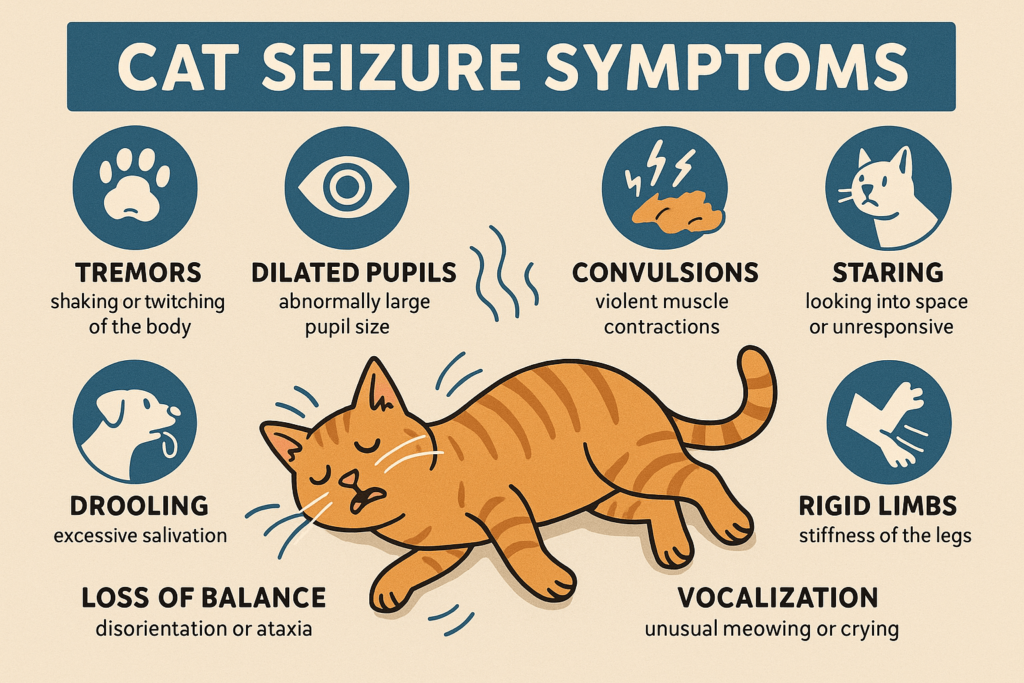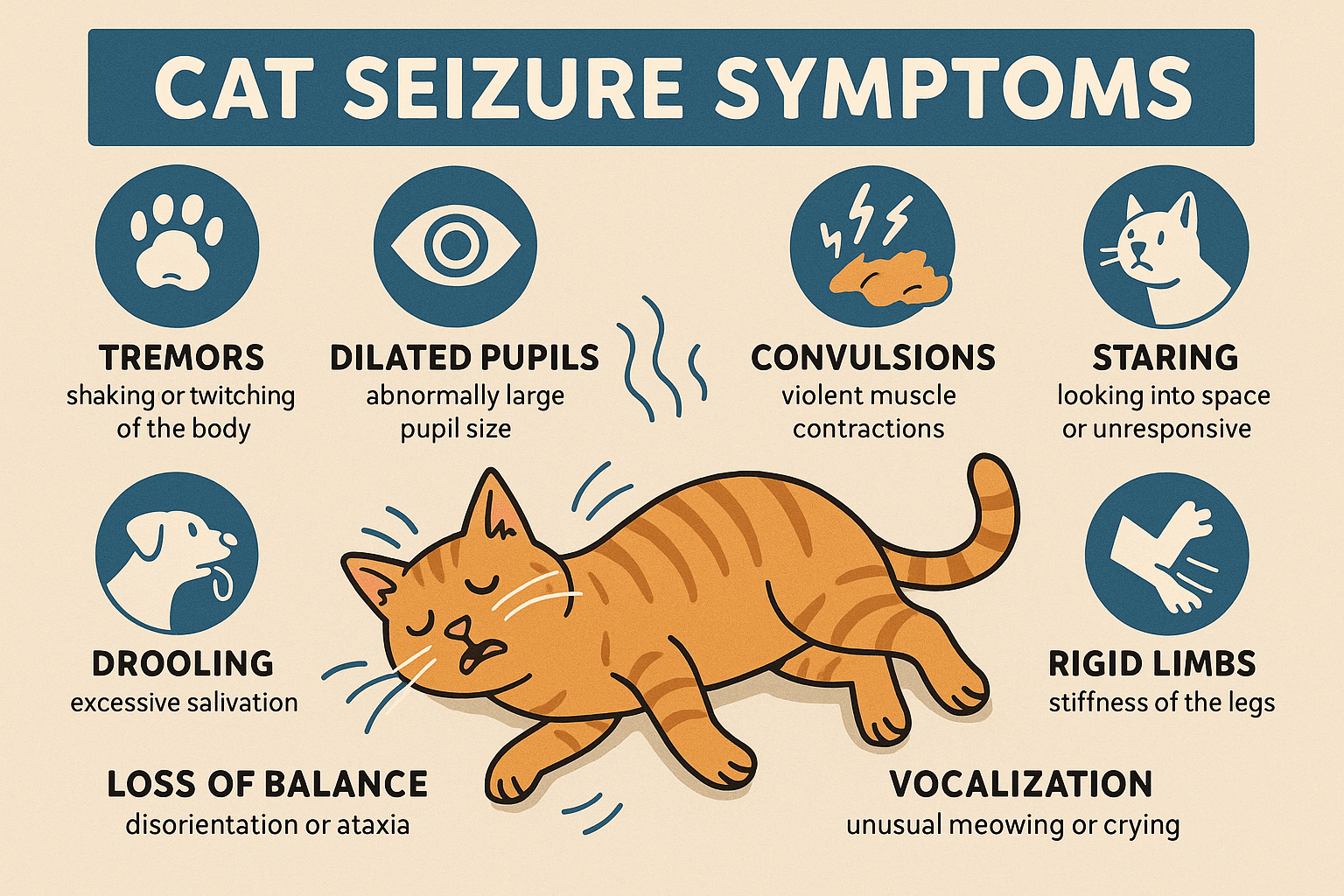Cat Seizure Symptoms: What Every Cat Owner Should Know
Seizures in cats can be alarming and confusing for pet owners, especially when they occur unexpectedly. These episodes, which may range from mild to severe, are often signs of an underlying health issue that requires prompt attention. Understanding cat seizure symptoms is crucial for identifying when your feline friend needs medical care. While seizures are less common in cats than in dogs, they can still occur due to a variety of causes, including epilepsy, poisoning, or metabolic disorders. In this guide, we’ll explore the signs to watch for, potential causes, and steps you can take to ensure your cat receives the care they need.
Expert Insight on Cat Seizures
“Seizures occur when a sudden spike in electrical activity in the brain causes your cat to have uncontrolled movements or enter an altered state of consciousness. Seizures in cats can also result in odd or out-of-place behavior, such as uncharacteristic aggression, uncontrolled meowing, or repetitive head moving.”
Recognizing Common Cat Seizure Symptoms
Seizures in cats can manifest in different ways, and recognizing these symptoms early is key to seeking timely veterinary intervention. Here are some of the most common signs to look out for:
Sudden Loss of Consciousness:
During a seizure, your cat may collapse and appear unresponsive, unable to react to stimuli like touch or sound.Uncontrolled Muscle Movements:
Jerking, twitching, or paddling motions of the limbs are hallmark signs of a seizure episode.Drooling or Foaming at the Mouth:
Excessive salivation or foaming can occur during a seizure, often accompanied by other physical symptoms.Vocalization or Crying Out:
Some cats may yowl, meow loudly, or make unusual sounds during a seizure due to confusion or distress.Temporary Blindness or Disorientation:
After a seizure, your cat may seem confused, disoriented, or unable to recognize familiar surroundings.
If you notice any of these symptoms, it’s important to document them and consult your veterinarian as soon as possible. Early diagnosis and treatment can make a significant difference in managing your cat’s condition.

Potential Causes of Seizures in Cats
Understanding the potential causes of seizures can help you better communicate with your vet and identify possible triggers. Here are some common factors that may contribute to seizure activity in cats:
Epilepsy:
Idiopathic epilepsy, though rare in cats, can cause recurrent seizures without a clear underlying cause.Toxic Exposure:
Ingesting toxic substances such as antifreeze, pesticides, or certain plants can lead to seizures and other neurological symptoms.Metabolic Disorders:
Conditions like diabetes, liver disease, or kidney failure can disrupt brain function and trigger seizures.Head Trauma or Injury:
A history of head injuries or trauma may increase the risk of seizures due to brain damage.Infections or Parasites:
Viral infections (e.g., feline infectious peritonitis) or parasitic infestations can affect the nervous system and lead to seizures.
Identifying the root cause of your cat’s seizures is essential for developing an effective treatment plan tailored to their specific needs.
Check this guide 👉What Can Trigger a Seizure in a Cat? Best 7 Expert Tips!
Check this guide 👉Signs of Cat Leukemia: Best 7 Expert Tips!
Check this guide 👉Metronidazole for Cats: Best 7 Expert Tips!
Signs of a Seizure in Cats | Possible Causes of Seizures |
|---|---|
Sudden loss of consciousness | Epilepsy |
Uncontrolled muscle movements | Toxic exposure (e.g., antifreeze) |
Drooling or foaming at the mouth | Metabolic disorders (e.g., liver disease) |
Vocalization or crying out | Head trauma or injury |
Temporary blindness or disorientation | Infections or parasites |
What to Do If Your Cat Has a Seizure
Witnessing your cat having a seizure can be frightening, but staying calm and taking the right steps can help protect your pet and provide valuable information to your vet.
Move Objects Away from Your Cat:
Clear the area around your cat to prevent injury from nearby objects during uncontrollable movements.Avoid Restraining Your Cat:
Holding or restraining your cat during a seizure can cause harm to both you and your pet. Let the episode run its course.Time the Seizure Duration:
Note how long the seizure lasts; prolonged episodes (lasting more than 5 minutes) require immediate emergency care.Comfort Your Cat Afterward:
Once the seizure ends, speak softly and offer gentle reassurance to help your cat recover from disorientation.Document Details for Your Vet:
Record observations about the seizure, including duration, symptoms, and any potential triggers, to share with your veterinarian.
Taking these steps ensures your cat’s safety and helps your vet diagnose and treat the underlying cause effectively.
Preventive Measures to Reduce Seizure Risks
While not all seizures can be prevented, there are steps you can take to minimize risks and promote your cat’s overall health and well-being.
Keep Toxic Substances Out of Reach:
Store household chemicals, medications, and toxic plants securely to prevent accidental ingestion.Schedule Regular Vet Check-Ups:
Routine exams allow your vet to monitor your cat’s health and catch potential issues before they escalate.Maintain a Balanced Diet:
Proper nutrition supports brain and organ function, reducing the likelihood of metabolic imbalances.Minimize Stressful Environments:
Create a calm, predictable environment for your cat, as stress can exacerbate certain conditions.Monitor for Behavioral Changes:
Early detection of unusual behaviors can help address problems before they develop into serious health concerns.
By implementing these preventive measures, you can help safeguard your cat against seizure-related complications.
Types of Seizures in Cats
Seizures in cats can vary in severity and presentation, depending on the underlying cause. Familiarizing yourself with the different types can help you describe episodes more accurately to your vet.
Generalized Seizures:
These involve the entire body and are characterized by loss of consciousness and violent muscle contractions.Partial Seizures:
Affect only part of the body, such as twitching in one limb or facial muscles, without full-body involvement.Psychomotor Seizures:
Involve sudden behavioral changes, such as aggression, pacing, or excessive licking, followed by a brief recovery period.Cluster Seizures:
Multiple seizures occurring within a short timeframe, often requiring urgent medical intervention.Status Epilepticus:
A life-threatening condition where a seizure lasts longer than 5 minutes or multiple seizures occur without recovery in between.
Knowing the type of seizure your cat experiences can aid in diagnosis and treatment planning.
Emergency Care for Seizures
In some cases, seizures may require immediate action to protect your cat’s life. Here’s what you need to know about providing emergency care.
Stay Calm and Focused:
Your calm demeanor will help you think clearly and act efficiently during an emergency.Contact Your Vet Immediately:
Call your veterinarian or an emergency clinic as soon as possible for advice and next steps.Do Not Administer Medication Without Guidance:
Giving medications without proper instructions can worsen the situation or interfere with treatment.Protect Your Cat’s Airway:
Ensure your cat’s head is tilted slightly downward to prevent choking on saliva or vomit.Transport Safely to the Vet:
Use a secure carrier to transport your cat to the clinic, keeping them calm and stable during the journey.
Quick thinking and appropriate actions can save your cat’s life during a seizure emergency.
Long-Term Management of Seizures
For cats diagnosed with chronic seizure disorders, long-term management is essential for maintaining their health and happiness.
Medication Adherence:
Follow your vet’s prescribed medication schedule strictly to control seizure frequency and severity.Regular Monitoring:
Schedule follow-up appointments to assess your cat’s response to treatment and adjust dosages as needed.Environmental Modifications:
Create a safe, stress-free home environment to minimize seizure triggers and promote relaxation.Track Seizure Patterns:
Keep a journal of seizure occurrences, noting timing, duration, and potential triggers to share with your vet.Educate Family Members:
Ensure everyone in your household knows how to respond appropriately if your cat has a seizure.
With consistent care and attention, many cats with seizure disorders can live happy, fulfilling lives.
Frequently Asked Questions About Cat Seizure Symptoms
How long do cat seizures usually last?
Most seizures last between 1-5 minutes, but prolonged episodes require immediate veterinary attention.
Can seizures be cured in cats?
Depending on the cause, seizures can sometimes be managed or eliminated through medication or treatment.
Are seizures painful for cats?
Cats typically do not feel pain during a seizure, but they may experience confusion or discomfort afterward.
What should I do if my cat has frequent seizures?
Consult your vet promptly to determine the cause and establish a treatment plan.
Can diet affect seizure frequency in cats?
Yes, certain diets—such as those low in carbohydrates or rich in specific nutrients—may help reduce seizure risks under veterinary guidance.
Being Prepared for Your Cat’s Health Needs
Understanding cat seizure symptoms and knowing how to respond can make a world of difference in ensuring your feline companion’s well-being. While seizures can be unsettling, early recognition and professional care can help manage the condition and improve your cat’s quality of life. By staying informed, proactive, and attentive to your cat’s behavior, you can provide the love and support they need to thrive. Remember, your veterinarian is your best ally in navigating this challenging situation, so don’t hesitate to reach out for guidance whenever necessary.
Can I Give My Cat Midol? Best 7 Expert Tips! – Learn the risks, symptoms, and safe alternatives to keep your cat healthy and avoid toxic reactions.
Can I Give My Dog Midol? Best 7 Expert Tips! – Discover the risks, safe alternatives, and expert advice to keep your dog safe from accidental poisoning.
Maximum Weight for Cats on Planes: Best 7 Expert Tips! – Learn airline policies, tips to stay compliant, and ensure safe travels for your feline friend.
Max Weight for Dogs on Planes: Best 7 Expert Tips! – Discover airline weight limits, safe travel tips, and solutions for flying with your dog stress-free.





